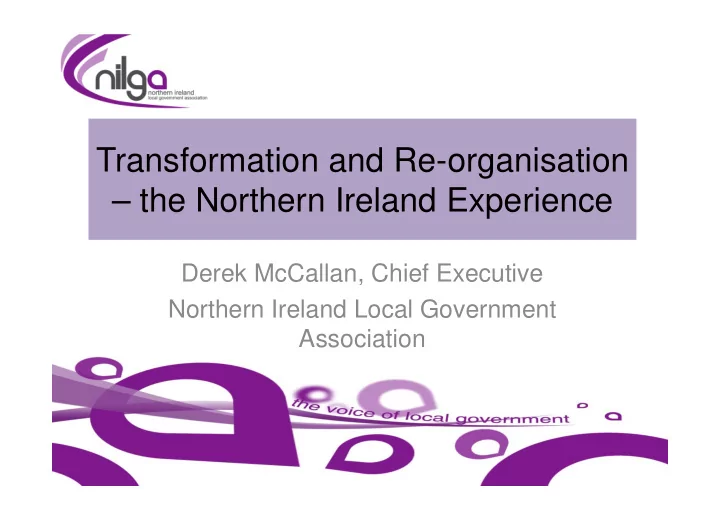

Transformation and Re-organisation – the Northern Ireland Experience Derek McCallan, Chief Executive Northern Ireland Local Government Association
NILGA • The representative body for Councils in Northern Ireland. • Offers regional (all NI) policy advice and collective analysis on critical issues for the sector. • Develops, improves and speaks up for local government, led by, and accountable to, the 26 district councils. • It will be led by & accountable to the 11 new councils emerging in 2015. • Builds strong local government by getting political leadership to combine across parties, in order to meet the needs of our sector & the community it serves.
A Long and Winding Road • Review launched by NI Executive June 2002 • 7 Council model announced in 2005 • July 2007 – Another review begins • March 2008 – 11 Council model announced • Reform Structures created • Hiatus due to funding and boundary concerns – Mid 2010 • Policy Proposals consulted upon – Nov 2010 • Draft legislation published Sept 2013 • Elections held in May 2014 • 11 Councils operating in “Shadow mode” • Go live – 1 April 2015 (yes, April Fool’s Day)
The Current Situation • Councils - limited powers and influence • Complex public sector picture at local level – too many cooks • Reform programme gathering speed - very different capacities between and within councils and departments • Devolution and a developing regional legislative Assembly • Economic downturn – limited resources • Reform is a target in the Programme for Government • Changing social agenda – e.g. welfare reform • Wanting more, delivering with less, ratepayer, media and government demands on the increase with 50% resource cuts and job losses in GB and similar draconian cuts in Ireland for councils – territorial austerity
Context for the Review • 26 Councils for 1.5m people • Potential to transfer some central government services to local councils: – Planning – Urban Regeneration – Car Parking – Others • New Functions/Duties: – Community Planning – General Power of Competence – Performance Improvement • Savings and efficiencies • Partnership between central and local government • STRONGER LOCAL GOVERNMENT – DOUBLE DEVOLUTION??
Progress or Process? - Regional • Re-establishment of regional reform governance structures: • Regional Transition Committee (Elected Members from each cluster plus NILGA Office Bearers) • Regional Transition Operating Board (Officers from local and central government) • 9 Working Groups (joint central and local government officers) – Legislation, Finance, Human Resources, System Convergence, Programme Delivery, Joint Employers & Trade Union Forum, Transfer of Functions, Communication, Community Planning • Local Government Act finalised – May 2014 – Various sub-ordinate legislation in the pipeline
Recent Progress - Local • Voluntary Transition committees established • These became Statutory in July 2013 – Appointed 11 Chief Executives via open competition – Preparations and Planning • 11 “shadow” councils in place from May 2014 – Capacity Building – Corporate Plans – Organisational Design – Striking Rate
Structural & Staffing Issues • Organisational Design • TUPE • Staff Transfer Schemes – Council/Council and Civil Service/Council • Differing Pension Arrangements • Variety of local terms, conditions, policies • Regional – Reform Joint Forum • Local - Joint Consultative forums in each cluster • COMMUNICATION
NILGA and the Reform Process • Wants to remove fear from the implementation programme • Is developing the capacity and competencies of elected members in LG • Is engaged in succession management with political parties • Will offer further regional political leadership on Performance Improvement for LG and its partners • Evidence Based Lobbying: £47 million reform package (2013) £0 million (2011) • Seeks to formalise two tier government here as part of the PFG 2016, properly, politically and beyond structures: “whole system review”
Key Opportunities • Community Planning – and linking with Development Plans • General Power of Competence • Local and central government promoting economic growth (e.g. £42bn National Government Infrastructure Loan Scheme, European Investment Bank) • A Programme for Local Government • Greater collaboration e.g. through I.C.E. programme, systems convergence, procurement toolkit • Celebrating the local – consistency is not homogeneity, boxes should be ignored, not ticked
PfLG = Foundations for a Journey • Councils must be part of a wider government • NILGA sees 2015 – 2019 partnership, formally contributing, as in all as merely the first neighbouring jurisdictions, to the priorities of government and the region. phase of local government’s • The democratic, civic, economic, social, contemporary, cultural, service delivery and partnership collective development credentials of our emerging 11 councils must put the local into government , more so than in the past. • PfLG provides the rationale for the proper • Provided that councils gain the investment and planning and resources to deal with increasing demands and functions, and gain the support of wider sustainability of our government within the NI Assembly and its democratically Departments, they will plan, co-ordinate and do mandated councils more and better things for more people, locally.
LOCAL GOVERNANCE = DRIVE ITSELF? THANK YOU.
Recommend
More recommend